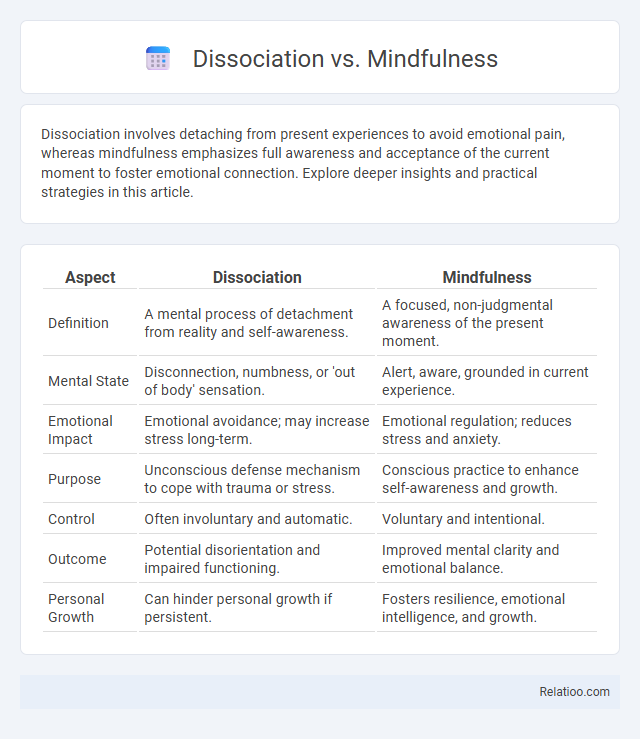Dissociation involves detaching from present experiences to avoid emotional pain, whereas mindfulness emphasizes full awareness and acceptance of the current moment to foster emotional connection. Explore deeper insights and practical strategies in this article.
Table of Comparison
| Aspect | Dissociation | Mindfulness |
|---|---|---|
| Definition | A mental process of detachment from reality and self-awareness. | A focused, non-judgmental awareness of the present moment. |
| Mental State | Disconnection, numbness, or 'out of body' sensation. | Alert, aware, grounded in current experience. |
| Emotional Impact | Emotional avoidance; may increase stress long-term. | Emotional regulation; reduces stress and anxiety. |
| Purpose | Unconscious defense mechanism to cope with trauma or stress. | Conscious practice to enhance self-awareness and growth. |
| Control | Often involuntary and automatic. | Voluntary and intentional. |
| Outcome | Potential disorientation and impaired functioning. | Improved mental clarity and emotional balance. |
| Personal Growth | Can hinder personal growth if persistent. | Fosters resilience, emotional intelligence, and growth. |
Understanding Dissociation: Definition and Symptoms
Dissociation is a psychological state characterized by a disconnection between thoughts, identity, consciousness, or memory, often triggered by trauma or extreme stress. Symptoms include feeling detached from reality, experiencing memory gaps, or feeling disconnected from one's body or surroundings. Understanding dissociation helps you differentiate it from mindfulness, which engages present-moment awareness and grounding rather than disconnection.
What is Mindfulness? Core Principles Explained
Mindfulness is the practice of intentionally focusing on the present moment with openness, curiosity, and without judgment, which contrasts sharply with dissociation, where the mind detaches from reality to escape stress or trauma. Core principles of mindfulness include awareness of breath, bodily sensations, and thoughts, fostering a connection with your current experience to enhance emotional regulation and reduce anxiety. Unlike dissociation, mindfulness empowers you to stay grounded in the here and now, promoting mental clarity and resilience.
Key Differences Between Dissociation and Mindfulness
Dissociation involves a disconnection from reality or self, often as a coping mechanism during trauma, whereas mindfulness centers on present-moment awareness and acceptance without judgment. Your ability to stay grounded distinguishes mindfulness as a conscious, intentional practice, while dissociation typically results in an involuntary detachment from surroundings or emotions. Key differences include awareness level, control, and emotional engagement, with mindfulness fostering clarity and dissociation leading to confusion or numbness.
Psychological Causes: Why Dissociation and Mindfulness Occur
Dissociation occurs as a psychological defense mechanism triggered by trauma, overwhelming stress, or anxiety, allowing Your mind to detach from painful experiences to protect emotional well-being. Mindfulness arises from intentional mental practices aimed at enhancing present-moment awareness and reducing stress through focused attention and acceptance. Understanding these distinct psychological causes helps clarify why dissociation serves as an unconscious escape, while mindfulness develops through conscious effort to foster emotional regulation and resilience.
Impact on Mental Health: Dissociation vs Mindfulness
Dissociation often disrupts mental health by causing detachment from reality, leading to increased anxiety, depression, and difficulty processing emotions. Mindfulness enhances mental well-being by promoting present-moment awareness, reducing stress, and improving emotional regulation. The contrasting impact underscores mindfulness as a therapeutic approach, while dissociation may signify underlying psychological distress requiring intervention.
Recognizing Signs: Dissociative States vs Mindful Awareness
Recognizing signs of dissociative states involves identifying experiences of detachment from reality, memory gaps, or a sense of unreality, commonly linked to trauma or stress. Mindful awareness, in contrast, is characterized by present-moment attention, intentional observation of thoughts and sensations without judgment, and a grounded sense of self. Differentiating dissociation from mindfulness requires observing whether an individual is disconnected and unaware or fully engaged and consciously aware.
Benefits and Risks: Mindfulness Compared to Dissociation
Mindfulness enhances your present-moment awareness, reducing stress and improving emotional regulation by promoting a non-judgmental focus on current experiences. Unlike dissociation, which often serves as a coping mechanism that can lead to detachment from reality and hinder emotional processing, mindfulness supports psychological resilience and mental clarity. While dissociation may carry risks of impaired functioning and fragmented identity, mindfulness provides benefits such as increased self-awareness and reduced symptoms of anxiety and depression.
Therapeutic Approaches: Treating Dissociation and Promoting Mindfulness
Therapeutic approaches for treating dissociation prioritize grounding techniques and trauma-focused cognitive behavioral therapy to reconnect Your awareness with the present moment, reducing detachment from reality. Mindfulness-based interventions, including mindfulness meditation and acceptance-based therapies, promote sustained present-moment awareness, enhancing emotional regulation and reducing dissociative episodes. Combining these strategies helps clinicians address dissociation by fostering resilience while cultivating mindfulness skills to improve overall psychological well-being.
Real-Life Examples: Dissociation vs Mindfulness in Action
Dissociation often manifests during trauma when your mind disconnects from the present reality, such as zoning out during a stressful event or feeling detached from your body. Mindfulness, on the other hand, involves actively grounding yourself in the present moment, like focusing on your breathing during a stressful meeting or noticing sensory details while walking. Real-life examples highlight how dissociation numbs emotional responses and impairs awareness, whereas mindfulness enhances emotional regulation and boosts overall well-being.
Building Resilience: Choosing Mindfulness Over Dissociation
Building resilience hinges on understanding the contrast between dissociation and mindfulness, where dissociation involves disconnecting from present experiences as a coping mechanism, often leading to emotional numbness and fragmented memory. Mindfulness promotes awareness and acceptance of the present moment, enhancing emotional regulation and cognitive flexibility, which are critical for resilience. Choosing mindfulness over dissociation strengthens the ability to adapt to stress and recover from adversity by fostering groundedness and sustained attention to internal and external experiences.

Infographic: Dissociation vs Mindfulness
 relatioo.com
relatioo.com